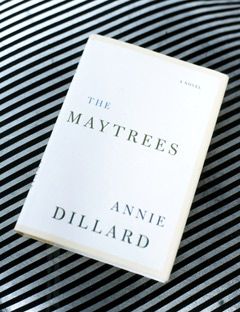Book Club: The Maytrees
The Maytrees

THE PLOT: Pulitzer Prize–winning author Annie Dillard spins a poetic love story about the seemingly perfect marriage of artsy intellectuals Lou and Toby Maytree. Perfect, that is, until Toby takes up with a woman named Deary and skips out on his wife and young son, leaving the reader to ponder whether it's really possible to love just one person for life.
LAUREN (ARTICLES EDITOR): I had mixed feelings about this book. I liked the story but the language was so off-putting. She writes these dense sentences like "Deary threw their kicking pieces in a basin, drew out another crab by its telson (Nausets used these for awls)...." And it's like, Are you trying to make me feel stupid?
YAEL (ASSOCIATE EDITOR) : And the vocabulary! She used words that I had never head of and which I didn't even feel dumb for never having heard them. Like thigmatropic or epistomeliac.
LAUREN: Yeah, I don't want to get a dictionary every other page. It takes the pleasure out of reading.
MARTY (DEPUTY EDITOR): I'm sort of two minds about the language. On one hand, I'm really glad this book is in the world. But on the other, I wondered if it is just out of date? Is it hard to access because you have to be older in order to be quiet enough to want to accept the challenge of the book? Am I just not trying hard enough? The language is so spare — so am I not Puritan enough?
JIHAN (EDITORIAL ASSISTANT:) But you can still get the overall sense of the story without having to look up every word.
LAUREN: Well. Oftentimes, thank god, she used simple language during the important plot points.
Get exclusive access to fashion and beauty trends, hot-off-the-press celebrity news, and more.
YAEL: Or, she would write in this crazy, poetic language but then make one comment about something like the Red Sox or soy sauce, which would totally bring you back to planet earth. But one thing I did love about the book was the philosophizing about love. Like when Maytree questions whether "the lasting love he studied, not mere emotion, might be willful focus of attention." Or wonders whether "lasting love is a rare evolutionary lagniappe" — that last word means gift by the way.
MARTY: But did you feel like Maytree or Lou was actually even capable of love as we know it? Or were they just sort of ruminating about it in an intellectual way?

YAEL: Well, I think we think of romantic love as passion or infatuation or the feeling of "I can't stand to not be with this person." But then, as it evolves, as it did for them, it transforms into these moments when you look at the other person and feel — I hate to sound cheesy —but complete. That your life is full because that person is there.
MARTY: I mean, they did have this quiet life. You know, when she described them being in bed together at the end when he was sick and she would crawl in bed with him? That's when I finally understood that kind of quiet thing that they had. Until then, their relationship didn't sound like a love story to me.
JIHAN: Well, the way he just up and left her! I thought it was really weird how Maytree's relationship with Deary came out of nowhere — there was no affair going on, no build up. So it was hard to get where he was coming from when he left. And I never really bought that he was so in love with Deary in the first place. And then he stays with her for twenty years? But I guess that was Dillard's problem for not really expanding on it.
MARTY: Well, he does say at one point that "he was obliged to love Deary."
LAUREN: My sense was, "Well I left Lou, so I have to stick it out with Deary."
SPOILER ALERT!!!
JIHAN: What do you guys think about the end when Lou takes both Maytree and Deary in and cares for them? I just don't know if I could do it.
LAUREN: Hell no. But I just thought they're weird non-conformist people who don't think about things the way other people do.
MARTY: At one point I asked myself, Is she a doormat? And then I thought, No. I think she's ok because she just this wild, acceptance person. So, I kind of got why she took them in. It was like "We had this history. It meant something once, it still means something." And that's what I mean by she wasn't a doormat. I think she's sort of more transcendent about it. She doesn't think she's unworthy. There's no negativity about her, she's just doing that Buddhist kind of thing, you know. And I don't think that she ever truly experienced loss. Or we didn't experience her loss. She just kind of dealt with stuff. "Well, that's the way it is." And was just accepting, "Ok. Well, that happened. Now, let's move on."
JIHAN: But I also felt that after Maytree left Lou she had this feeling of having to save face, not show that she was hurt. So when she wrote them letters and offered to let them stay with her, I feel like she almost felt like she had to do it to make that statement, "I'm ok."
LAUREN: One of the things I felt like made the whole book worthwhile was that it made me think about my own mortality. You know, when Maytree is reading prehistory and ethnographies and he's trying to figure out what makes a full life — what are we here for. And finally, he realizes he didn't get anything out of all that studying and concludes "whether his work lasted was less crucial now than whether Manny [his grandson] would straddle his shins a little while longer." It was a really cute, beautiful, poetic way of saying what really matters is the people you love — not your fame or legacy. That felt nice and cathartic to me. He was human again. Because he was kind of a robot to me.
MARTY: Yeah. He was supposed to be this poet and living in his head, and I never felt like he had very profound thoughts. And I was like, "Eh, he must not be a very good poet." I felt like Lou was way more wise than he was. But, I find it interesting that she never had overwhelming moments of emotion. But on the other hand, no one did. One of the words that summed up the book for me was emotionless. And I understand that it was the point, and so I respect it for that. But I didn't like it.
LAUREN: Who wants people to live that way?
Next Month: Rules for Saying Goodbye by Katherine Taylor (Picador)
Dedicated to women of power, purpose, and style, Marie Claire is committed to celebrating the richness and scope of women's lives. Reaching millions of women every month, Marie Claire is an internationally recognized destination for celebrity news, fashion trends, beauty recommendations, and renowned investigative packages.